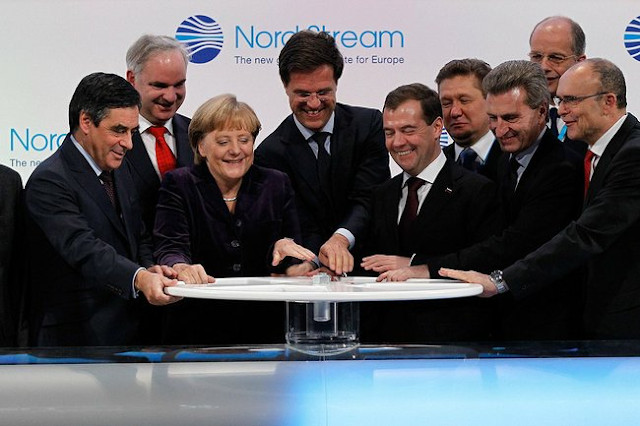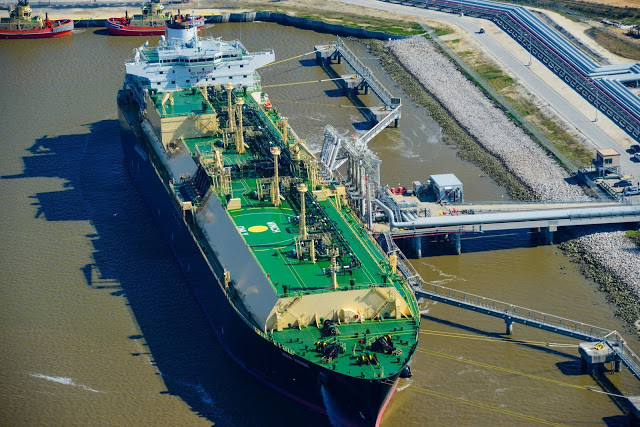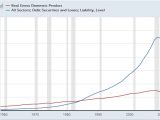
Blocking Nord Stream 2: To Fight "Russian Dictatorship," US Dictates to Europe
December 19, 2018December 20, 2018 (Tony Cartalucci - NEO) - Rarely is irony and hypocrisy so thoroughly combined as it was when the US House of Representatives passed resolution 1035 - "Expressing opposition to the completion of Nord Stream II" (.pdf).
Bloomberg in its article, "U.S. House Passes Resolution Opposing Russian Gas Pipeline," would report:
And while the resolution itself is "non-binding," the resolution itself admits it:
The Nord Stream 2 pipeline circumvents Ukraine through which Russia had previously shipped natural gas to the rest of Europe. The Russian Federation, and before that, the Soviet Union had for decades reliably supplied Europe with natural gas through Ukraine.
It was not until an openly US-backed putsch swept the elected government of Ukraine from power in 2014 and transformed Ukrainian foreign policy into being openly hostile toward Moscow, that gas flow was jeopardized, prompting Russia to pursue alternatives - including Nord Stream 2.
US Dictates to Europe to Save it from a "Russian Dictatorship?"
Russia's Nord Stream 2 pipeline is not a unilateral project - it includes partners from Germany such as Uniper SE and Wintershall, as well as Dutch natural gas infrastructure and transportation company, Gasunie.
The pipeline has also been approved by the elected German government itself.
German public media, Deutsche Welle (DW), in an article titled, "Germany approves Nord Stream 2 gas pipeline," would report:
In what is essentially a bilateral deal between Germany and Russia, the US - from the other side of the Atlantic Ocean - "expresses opposition" to the Nord Stream 2 pipeline and is preparing to target companies involved to prevent the pipeline's completion and use.
It is the ultimate irony and the pinnacle of hypocrisy that the US claims in its own resolution that Russia seeks to "control" European energy markets while the US House resolution itself is an open demonstration of Washington's desire to control European energy policy.
Where Europe buys its energy would presumably be Europe's - not Washington's - business. It is unlikely that Washington would respond well to Europe attempting to pressure the United States into drastically changing its energy policy for whatever reason - particularly through coercive economic sanctions.
"Diversifying" Means Buying Anglo-American Petrochemicals
The US resolution mentions the Southern Gas Corridor as part of US "policy to support European energy security through diversification of supplies."
That pipeline connects gas taken mostly from the Shah Deniz gas field in Azerbaijan which is jointly owned by British Petroleum and the State Oil Company of Azerbaijan (SOCAR), but also Turkish and Russian interests as well.
What the US resolution does not mention - likely recognizing just how transparent US motivations would be if it did - is the other option the US is promoting EU energy diversification with.
In Politico's 2014 article, "US pushes for EU energy diversification," this other option would be spelled out. The article would admit (emphasis added):
First, Russia has more proven natural gas reserves than the US. Forbes itself would admit that US domination of gas production would only last a few more years.
Second, transporting gas across the Atlantic Ocean as liquid natural gas (LNG) is more expensive than through existing pipelines delivering Russian gas to Europe.
These are not conclusions drawn by Gazprom executives or the Kremlin, but rather America's own corporate-funded policymakers.
A 2014 Brookings Institution report titled, "Why Russian Natural Gas Will Dominate European Markets," would admit:
US Uses Coercion/Conflict to Compensate for Inability to Compete
To compensate for America's inability to compete through free and fair markets, Washington has resorted to a number of more dubious measures.
The 2014 violent overthrow of the Ukrainian government and the subsequently hostile regime Washington is backing in Kiev is one part of this equation.
Provocations including the more recent Kerch Strait incident help maintain political pressure on Moscow and attempt to ratchet up tensions between Moscow and its European energy partners.
Moving NATO up to Russia's borders through such provocations helps produce and maintain wider tensions and instability amid Russian-European ties.
Passing resolutions opposing Russian pipelines and threatening economic sanctions against companies based in supposedly "allied" states is another measure.
The now 2-year-long "Russiagate" disinformation campaign, vilifying Russia is yet another.
Articles and editorials across the Western media are piggybacking on the "Russiagate" narrative and resulting Russophobia to sell America's rationale for undermining European sovereignty by dictating who European nations can and cannot do business with.
US State Department-funded and directed Radio Free Europe/Radio Liberty (RFE/RL) in its September 2018 article, "Pipeline From Hell? Nord Stream 2 And Why It's So Contentious," is one such example.
The article claims:
The article admits:
It also admits:
While the article - and many others like it - suggest Nord Stream 2 is an "instrument of Russian state policy" and represents a threat to Europe's independence, US opposition to the pipeline and Russian energy supplies to Europe in general have manifested itself in the form of political meddling, economic coercion, and even violent coups and conflict as seen in Ukraine from 2014 onward.
At the end of the day, if "Germany, Italy and others are happy to make deals" with Russia, why would the US - self-appointed arbiter of global freedom and democracy - presume to have a say otherwise?
How do deep economic ties between Europe and Russia pose a problem to regional or global peace when the alternative - as the US clearly demonstrates - is not only a growing political, economic, and even military confrontation with Russia - but also the economic coercion and threatening of America's own European allies?
Little adds up regarding America's narrative regarding Nord Stream 2. What is clear through objective observation is Washington's desire to eliminate a competitor at all costs - and to do so not through actual competition, but through coercion and the threat of increasingly dangerous conflict specifically because it cannot compete economically.
Since the US admittedly cannot compete economically, its success or failure will depend entirely on its ability to wield its wide arsenal of "soft power" weaponry - coercion, subversion, sanctions, and conflict by proxy. How far the US will go to ensure success is a matter only time can tell.
Tony Cartalucci, Bangkok-based geopolitical researcher and writer, especially for the online magazine “New Eastern Outlook”.
Bloomberg in its article, "U.S. House Passes Resolution Opposing Russian Gas Pipeline," would report:
The U.S. House of Representatives approved a largely symbolic resolution expressing opposition to Gazprom PJSC’s $11 billion Nord Stream 2 natural gas pipeline, on concerns that the project will boost the Kremlin’s control over Europe’s energy supplies.Bloomberg would also report (emphasis added):
While the resolution is non-binding, it highlights growing Congressional opposition to the Russian project. The Trump administration is reviewing potential sanctions against the European companies involved. The pipeline, which would send Russian gas to Germany, has financing agreements with Engie SA and Royal Dutch Shell Plc, among others.By passing this resolution, the United States presumes to dictate to all of Europe who they can and cannot do business with.
And while the resolution itself is "non-binding," the resolution itself admits it:
...supports the imposition of sanctions with respect to Nord Stream II under section 232 of the Countering America's Adversaries Through Sanctions Act (22 U.S.C. 9526).
The Nord Stream 2 pipeline circumvents Ukraine through which Russia had previously shipped natural gas to the rest of Europe. The Russian Federation, and before that, the Soviet Union had for decades reliably supplied Europe with natural gas through Ukraine.
It was not until an openly US-backed putsch swept the elected government of Ukraine from power in 2014 and transformed Ukrainian foreign policy into being openly hostile toward Moscow, that gas flow was jeopardized, prompting Russia to pursue alternatives - including Nord Stream 2.
US Dictates to Europe to Save it from a "Russian Dictatorship?"
Russia's Nord Stream 2 pipeline is not a unilateral project - it includes partners from Germany such as Uniper SE and Wintershall, as well as Dutch natural gas infrastructure and transportation company, Gasunie.
The pipeline has also been approved by the elected German government itself.
German public media, Deutsche Welle (DW), in an article titled, "Germany approves Nord Stream 2 gas pipeline," would report:
Germany has given a green light to the construction of the controversial Nord Stream 2 gas pipeline under the Baltic Sea, the Federal Maritime and Hydrographic Agency said Tuesday.
The decision means all legal hurdles to building a 31-kilometer (20 mile) section of the pipeline in Germany's exclusive economic zone have been cleared. In January, authorities approved construction of a gas pipeline segment in German territorial waters.
In what is essentially a bilateral deal between Germany and Russia, the US - from the other side of the Atlantic Ocean - "expresses opposition" to the Nord Stream 2 pipeline and is preparing to target companies involved to prevent the pipeline's completion and use.
It is the ultimate irony and the pinnacle of hypocrisy that the US claims in its own resolution that Russia seeks to "control" European energy markets while the US House resolution itself is an open demonstration of Washington's desire to control European energy policy.
Where Europe buys its energy would presumably be Europe's - not Washington's - business. It is unlikely that Washington would respond well to Europe attempting to pressure the United States into drastically changing its energy policy for whatever reason - particularly through coercive economic sanctions.
"Diversifying" Means Buying Anglo-American Petrochemicals
The US resolution mentions the Southern Gas Corridor as part of US "policy to support European energy security through diversification of supplies."
That pipeline connects gas taken mostly from the Shah Deniz gas field in Azerbaijan which is jointly owned by British Petroleum and the State Oil Company of Azerbaijan (SOCAR), but also Turkish and Russian interests as well.
What the US resolution does not mention - likely recognizing just how transparent US motivations would be if it did - is the other option the US is promoting EU energy diversification with.
In Politico's 2014 article, "US pushes for EU energy diversification," this other option would be spelled out. The article would admit (emphasis added):
In a joint statement issued this morning, the US and EU said that both sides underlined the importance of co-operation on smart grids, energy storage, nuclear fusion, hydrogen and fuel cells, energy efficiency, nuclear and unconventional hydrocarbons (shale gas).By 2018, Forbes would report in its article, "The U.S. Is Still The Global Natural Gas King," that:
In 2017, the U.S. produced an average of 71.1 billion cubic feet per day (Bcf/d) of natural gas. That's a 1.0% increase from 2016 production, but not quite good enough to beat the 2015 record of 71.6 Bcf/d.Forbes would put the numbers in perspective, reporting:
...natural gas production for the entire Middle East was 63.8 Bcf/d. Russia, in second place among countries, saw its natural gas production surge by 8.2%, but at 61.5 Bcf/d that was still well behind the U.S.But two fundamental problems impede US energy dominance in Europe.
First, Russia has more proven natural gas reserves than the US. Forbes itself would admit that US domination of gas production would only last a few more years.
Second, transporting gas across the Atlantic Ocean as liquid natural gas (LNG) is more expensive than through existing pipelines delivering Russian gas to Europe.
These are not conclusions drawn by Gazprom executives or the Kremlin, but rather America's own corporate-funded policymakers.
A 2014 Brookings Institution report titled, "Why Russian Natural Gas Will Dominate European Markets," would admit:
LNG is more expensive, and it will take many years to get other competitive supplies, for instance from the Caspian region, into the market.If the US cannot possibly compete in free and fair markets, why is Washington so confident it can still "support European energy security through diversification of supplies?"
US Uses Coercion/Conflict to Compensate for Inability to Compete
To compensate for America's inability to compete through free and fair markets, Washington has resorted to a number of more dubious measures.
The 2014 violent overthrow of the Ukrainian government and the subsequently hostile regime Washington is backing in Kiev is one part of this equation.
Provocations including the more recent Kerch Strait incident help maintain political pressure on Moscow and attempt to ratchet up tensions between Moscow and its European energy partners.
Moving NATO up to Russia's borders through such provocations helps produce and maintain wider tensions and instability amid Russian-European ties.
Passing resolutions opposing Russian pipelines and threatening economic sanctions against companies based in supposedly "allied" states is another measure.
The now 2-year-long "Russiagate" disinformation campaign, vilifying Russia is yet another.
Articles and editorials across the Western media are piggybacking on the "Russiagate" narrative and resulting Russophobia to sell America's rationale for undermining European sovereignty by dictating who European nations can and cannot do business with.
US State Department-funded and directed Radio Free Europe/Radio Liberty (RFE/RL) in its September 2018 article, "Pipeline From Hell? Nord Stream 2 And Why It's So Contentious," is one such example.
The article claims:
Nord Stream 2 has been sharply criticized by several countries, both within the EU and abroad. Opponents of the project fear the pipeline will increase the bloc's substantial dependence on Russian gas and argue that it runs counter to international sanctions imposed on Russia following its annexation of Ukraine’s Crimean Peninsula.The article eventually admits nations "sharply criticizing" Nord Stream 2 "both within the EU and abroad," are actually the United States and its US-NATO proxies in Poland, the Baltic states, and of course Ukraine.
The article admits:
Germany, Italy, and others still appear to be happy to make deals with Russian gas monopoly Gazprom, but countries from the former Eastern Bloc, such as Poland, have become especially wary of Moscow's growing influence.
It also admits:
Latvia and Estonia have echoed Polish and Lithuanian concerns. All three Baltic states and Poland have signed a joint letter that calls Nord Stream 2 "an instrument of Russian state policy," which "should be seen in the broader context of today's Russian information and cyber-hostilities and military aggression."
While the article - and many others like it - suggest Nord Stream 2 is an "instrument of Russian state policy" and represents a threat to Europe's independence, US opposition to the pipeline and Russian energy supplies to Europe in general have manifested itself in the form of political meddling, economic coercion, and even violent coups and conflict as seen in Ukraine from 2014 onward.
At the end of the day, if "Germany, Italy and others are happy to make deals" with Russia, why would the US - self-appointed arbiter of global freedom and democracy - presume to have a say otherwise?
How do deep economic ties between Europe and Russia pose a problem to regional or global peace when the alternative - as the US clearly demonstrates - is not only a growing political, economic, and even military confrontation with Russia - but also the economic coercion and threatening of America's own European allies?
Little adds up regarding America's narrative regarding Nord Stream 2. What is clear through objective observation is Washington's desire to eliminate a competitor at all costs - and to do so not through actual competition, but through coercion and the threat of increasingly dangerous conflict specifically because it cannot compete economically.
Since the US admittedly cannot compete economically, its success or failure will depend entirely on its ability to wield its wide arsenal of "soft power" weaponry - coercion, subversion, sanctions, and conflict by proxy. How far the US will go to ensure success is a matter only time can tell.
Tony Cartalucci, Bangkok-based geopolitical researcher and writer, especially for the online magazine “New Eastern Outlook”.



